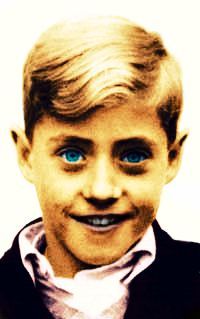

Perhaps it had something to do with their personalities. The Who – as the Detours became known, after a brief, unsuccessful stint as the High Numbers – never quite caught on at the level of their rivals. The Detours suddenly found themselves in good company – at least management-wise. More importantly, Meaden was business partners with a guy named Andrew Loog Oldham, a fellow Jew who happened to manage an up-and-coming electric blues group by the name of the Rolling Stones. The next manager was Pete Meaden, whose father, Stanley Meaden, was “half Jewish,” according to Daltrey.
#Young roger daltrey professional#
Gordon had money “to waste on a rock band,” writes Daltrey, and he bought them a van, professional amplifiers, and paid for studio time for their initial recordings. “Helmut Gordon was a Jewish German doorknob manufacturer who wanted to be the next Brian Epstein,” writes Daltrey, referring to the Jewish visionary who steered a scruffy foursome of Liverpudlians to fame and fortune as a combo called the Beatles.

By spring 1964, the Detours attracted their first manager.
#Young roger daltrey mod#
The antithesis of Mods were rockers, who favored leather jackets, motorcycles, American rock ‘n’ roll, and pompadours – think early Beatles or what we in America used to call “greasers.” (The competition between Mods and rockers, which included violent encounters, would be the subject of the Who’s 1973 rock opera, “Quadrophenia.”) While never fully committed to the Mod lifestyle, being identified as Mods helped the Detours establish their identity at a time when their image might have mattered more than their level of skill.Īround that time, the Detours frequently gigged at a Jewish club in Ealing, presumably explaining why Daltrey made Pete Townshend play “Hava Nagila” when he auditioned for the guitar slot in the band. The Mod subculture was very much a product of London’s Jewish East End. Mods wore tailored suits and were fond of modern jazz, Italian and French cinema, and motor scooters. For Daltrey, most of the motivation for showing up for work each day was so he could pinch tools and materials from the site to aid him in building his own guitars, until he could afford to buy a real one.ĭaltrey hooked up with some likeminded friends, and by 1959 they were gigging around as a Mod band called the Detours. Having left school at an early age, Daltrey was hired by a small metalworking shop, primarily as a tea-boy (they take their tea seriously over in England) before graduating to hands-on work as a cutter and fitter. Kibblewhite: My Story” (Henry Holt) – a horribly titled but entertaining and revealing read - Roger Daltrey gives his version of the story of the rock band, the Who, territory that his bandmate and on-again, off-again friend and collaborator, Pete Townshend, already reviewed in his own chronicle, “Who I Am.” Like Townshend, Daltrey pays tribute to the group’s early Jewish managers and to the Mod fashions the group adopted, created by tailors in Jewish East London He also recounts paths crossed with two of the most notorious Jewish gangsters of all time, and the surprise of learning that he had a Jewish daughter.īorn and raised in the rough, working-class neighborhoods of heavily-bombed Acton and Shepherd’s Bush, Daltrey, like so many other British would-be rockers of his generation, got bitten by the rock ‘n’ roll bug as a young teenager, when the sounds of Elvis Presley and Bill Haley first entered England’s dreaming.


 0 kommentar(er)
0 kommentar(er)
